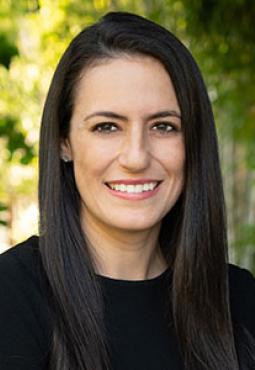Surgical oncologist Jamie Rand, M.D., has experienced the toll of cancer in a deeply personal way. Four years ago, she lost her mother to a rare form of the disease. Throughout her family’s journey, the physician took on an active role supporting her mother.
“I was a big advocate for her,” said Rand, a City of Hope assistant professor in the Division of Breast Surgery. “That sort of support doesn’t always change outcomes, but it definitely makes the burden a little easier to manage.

“That experience has certainly influenced how I approach cancer care,” she added. “For my own patients, I try to be the advocate I was for my mom. I really pour my heart into every patient.”
“Dr. Rand is an amazing physician,” says Veronica Jones, M.D., chief and an assistant professor in the Division of Breast Surgery. “She is highly innovative, brilliant, caring and diligent.”
The breast cancer surgeon augments her compassionate care with science exploring new strategies to provide better outcomes for breast cancer patients. Her research focuses on piloting technologies designed to minimize side effects for those with early-stage disease and hunting for answers to advanced disease through immunotherapy, a powerful class of treatments that harness the body’s natural defenses against cancer.
The Promise of Immunotherapy
“As a field, it’s great that we’ve been able to improve outcomes for the majority of breast cancer patients,” Rand said. “But we still have a lot to learn. Are we overtreating early breast cancer — can we back down in specific cases? And what do we do for the small percentage who aren’t helped by our current treatments?”
In one line of inquiry, she leads a City of Hope clinical trial for patients with triple-negative breast cancer, an aggressive form of disease that can resist therapy. The study tests the safety and efficacy of an immunotherapy delivered by a virus that’s been genetically reprogrammed to seek out cancer cells. That investigation harkens back to Rand’s days studying skin cancer when she was a resident at Memorial Sloan Kettering Cancer Center.
“In patients with advanced melanoma who formerly faced a tough prognosis, new immunotherapy regimens have resulted in cures for an increasing number of people,” she said. “Unfortunately, we haven’t had that same success in some other cancers. So I’m seeing if we can make breast cancer cells more responsive to immunotherapy and examining different types of these treatments in hopes of stimulating the immune system to fight cancer the same way it has in melanoma.”
Minimally Invasive Robotic Surgery
In addition, Rand has recently broken ground in adapting robotic surgery for breast cancer. In the technique, a surgeon works from a console, guiding the movements of a camera and mechanical arms that enter the body through a tiny incision. Robotic surgery has been a gamechanger in prostate cancer treatment. Patients generally have fewer side effects and recover faster after surgery, sometimes delivered as an outpatient procedure.
Aiming to extend those types of benefits to early-stage breast cancer patients, Rand is involved with a clinical trial making her one of the first doctors in the United States to perform small incision, robotic nipple-saving mastectomy. It’s a moment she very much looked forward to.
“This could be a really exciting platform for treatment,” she said. “With breast cancer patients living longer and longer, I’m particularly interested in minimizing the negative side effects that patients may have after therapy.”
In the same vein, Rand leads a new clinical trial testing a nonsurgical procedure that scorches away tumors using a laser. Laser ablation is already in use against certain gastrointestinal, genitourinary and skin cancers as well as some precancerous conditions. With success in this and subsequent studies, Rand and her colleagues could make laser ablation a less-invasive option for early-stage breast cancer, performed in an office using localized numbing medicine.
What Inspires Her
She attributes her original choice to pursue her calling as a breast cancer surgeon to the impact of her family.
The earliest inklings of her interest in medicine began with visits to her father’s ophthalmology practice as a child, during which she would marvel at the machines he worked with. She also had a role model in her grandmother — an activist who led the Michigan chapter of the National Organization of Women and a late-in-life law student who passed the bar at age 65.
“I come from a family of strong women, and women supporting women,” Rand said. “It makes sense that I like taking care of women, who make up the vast majority of breast cancer patients.”
Of course, she goes beyond just taking care of women; she strives to raise their standard of care. According to her, the chance to push the envelope of breast cancer treatment was part of what first drew her to City of Hope in 2019.
“The opportunities for research are amazing,” Rand said. “I’m inspired by being here, by the science going on around us, by the people who graciously provide their time to be mentors.
“I’m especially inspired by what we can accomplish together.”